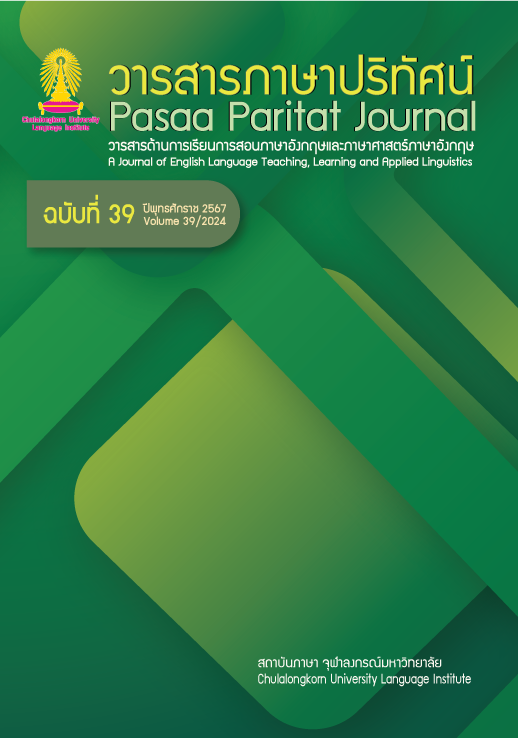Empowering Teachers through a Training on Exploratory Action Research
DOI:
https://doi.org/10.58837/CHULA.PPJ.39.13Keywords:
Exploratory Action Research, professional development, classroom research, teaching practiceAbstract
Professional development is a requirement for Thai schoolteachers for their annual evaluation. Engaging in teacher-research can be one of the options of the professional development programs for schoolteachers. Exploratory Action Research (EAR), one kind of teacher-research, has been introduced to schoolteachers in primary and secondary classes in Thailand. With the collaboration between the British Council Thailand and King Mongkut’s University of Technology Thonburi, pilot training on EAR was launched in 2022. The objective of the training is to provide teachers with knowledge and skills for conducting EAR. During this particular project, the trainees received guidance from two trainers through webinars and two mentors through online mentoring to complete their EAR. This research was conducted to investigate how this training changed teachers who were involved with it. With the recommendation from two mentors and voluntary participation, seven schoolteachers were interviewed. The results revealed both benefits and challenges. Schoolteachers experienced significant shifts in their beliefs towards teacher-research and teaching. The classroom research was perceived practical while the problems in the classroom were systematically tackled. Moreover, the importance of building rapport with the students was also reported by schoolteachers. Hence, the EAR training has shaped the schoolteachers’ roles towards being teacher-researchers.
References
Avalos, B. (2011). Teacher professional development in teaching and teacher education over ten years. Teaching and Teacher Education, 27(1), 10–20. https://doi.org/10.1016/j.tate.2010.08.007
Borko, H. (2004). Professional development and teacher learning: Mapping the terrain. Educational Researcher, 33(8), 3–15. https://doi.org/10.3102/0013189X033008003
Burns, A. (2017). Research and the teaching of speaking in the second language classroom. In E. Hinkel (Ed.), Handbook of research in second language teaching and learning (pp. 242–256). Routledge.
Castleberry, A., & Nolen, A. (2018). Thematic analysis of qualitative research data: Is it as easy as it sounds? Currents in Pharmacy Teaching and Learning, 10(6), 807–815. https://doi.org/10.1016/j.cptl.2018.03.019
Darling-Hammond, L. (2017). Teacher education around the world: What can we learn from international practice? European Journal of Teacher Education, 40(3), 291–309. https://doi.org/10.1080/02619768.2017.1315399
Darling-Hammond, L., Hyler, M. E., & Gardner, M. (2017). Effective teacher professional development. Learning Policy Institute. https://doi.org/10.54300/122.311.
Dempsey, N. P. (2010). Stimulated recall interviews in ethnography. Qualitative Sociology, 33(3), 349–367. https://doi.org/10.1007/s11133-010-9157-x
Desimone, L. M. (2009). Improving impact studies of teachers’ professional development: Toward better conceptualizations and measures. Educational Researcher, 38(3), 181–199. https://doi.org/10.3102/0013189X08331140
Desimone, L. M., & Pak, K. (2017). Instructional coaching as high-quality professional development. Theory Into Practice, 56(1), 3–12. https://doi.org/10.1080/00405841.2016.1241947
Fishman, B. J., Penuel, W. R., Allen, A.R., Cheng, B. H., & Sabelli, N. (2013). Design-based implementation research: An emerging model for Transforming the relationship of Research and practice. Teachers College Record, 115(14), 136–156. https://doi.org/10.1177/016146811311501415
Garet, M. S., Porter, A. C., Desimone, L., Birman, B. F., & Yoon, K. S. (2001). What makes professional development effective? Results from a national sample of teachers. American Educational Research Journal, 38(4), 915–945. https://doi.org/10.3102/00028312038004915
Herr, K., & Anderson, G. L. (2015). The action research dissertation: A guide for students and faculty. Sage Publications.
Ingersoll, R., Merrill, E., Stuckey, D., & Collins, G. (2018). Seven trends: The transformation of the teaching force. Consortium for Policy Research in Education, University of Pennsylvania. https://repository.upenn.edu/bitstreams/e5d6f59f-18ee-4eee-a884-4fc85714f103/download
Kennedy, M. M. (2016). How does professional development improve teaching? Review of Educational Research, 86(4), 945–980. https://doi.org/10.3102/0034654315626800
Mills, G. E. (2011). Action research: A guide for the teacher researcher. Pearson.
Opfer, V. D., & Pedder, D. (2011). Conceptualizing teacher professional learning. Review of Educational Research, 81(3), 376-407. https://doi.org/10.3102/0034654311413609
Rebolledo, P., Smith, R., & Bullock, D. (Eds.) (2016). Champion teachers: Stories of Exploratory action research. British Council. https://www.teachingenglish.org.uk/sites/teacheng/files/pub_british_council_champion_teachers_1.pdf
Sagor, R. (2011). The action research guidebook: A four-step process for educators and school teams (2nd ed.). Corwin.
Serin, H. (2018). A comparison of teacher-centered and student-centered approaches in educational settings. International Journal of Social Sciences & Educational Studies, 5(1), 164–167. https://doi.org/10.23918/ijsses.v5i1p164
Smith, R. (2015) Exploratory action research as workplan: Why, what and where from? In Dikilitas, K., Smith, R. & Trotman, W (Eds.) Teacher-researchers in action (pp. 37–45.) IATEFL Research Special Interest Group.
Smith, R. & Rebolledo, P. (2018). A handbook for exploratory action research. British Council.
Yoon, K. S., Duncan, T., Lee, S. W.Y., Scarloss, B., & Shapley, K. (2007). Reviewing the evidence on how teacher professional development affects student achievement (Issues & Answers Report, REL 2007–No. 033). U.S. Department of Education, Institute of Education Sciences, National Center for Education Evaluation and Regional Assistance, Regional Educational Laboratory Southwest. https://ies.ed.gov/ncee/edlabs/regions/southwest/pdf/rel_2007033.pdf
Downloads
Published
How to Cite
Issue
Section
License
Copyright (c) 2024 Pasaa Paritat Journal

This work is licensed under a Creative Commons Attribution-NonCommercial-NoDerivatives 4.0 International License.



